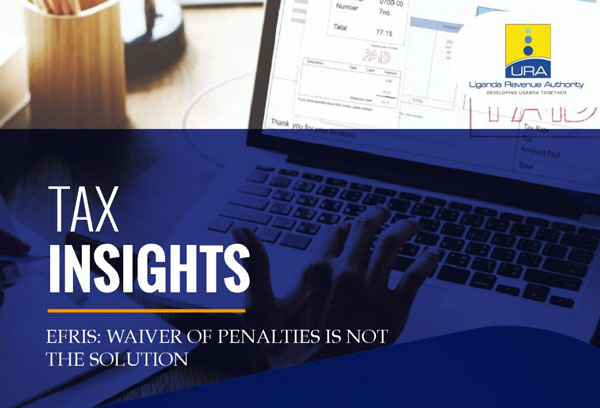
COMMENT | THE INDEPENDENT | Following a strike by the traders in Uganda, the Government has directed the Uganda Revenue Authority (URA) to suspend the penalties imposed on taxpayers for not implementing the Electronic Fiscal Receipting and Invoicing Solution (EFRIS) and is considering possible waiver of the penalties, although the taxpayers are to continue using EFRIS and paying Value Added Tax (VAT). This alert adapted from the KAA website, analyzes the problems with EFRIS and possible solutions.
****
EFRIS was introduced under the Tax Procedures Code (Amendment) Act, 2018 which mandates a taxpayer to issue an e-invoice or e-receipt or to employ an electronic fiscal device linked to the URA’s centralised invoicing and receipting system or a device authenticated by URA. To ensure compliance, a new Section 73B was introduced to penalize any designated taxpayer who does not comply with the law. The use of EFRIS is mandatory for all VAT registered tax payers.
To better-understand the current uproar against EFRIS, one needs to see it through the lens of a business owner in Uganda, especially one in the informal sector.
First of all, it is not in dispute that the use of EFRIS comes at a cost and a taxpayer who does not comply is likely to be penalized. Operating EFRIS as rolled out by URA requires a taxpayer to incur expenses which were not contemplated in the business and is quite challenging for the informal sector.
For a business to use EFRIS, it needs computers, software, a reliable power source, internet connectivity, a printer, and an accountant who is competent in tax matters. The taxpayer also has to keep proper records of all the business purchases and sales. Additionally, the business owner is required to charge 18% VAT and file monthly VAT returns. The said taxpayer would also be required to pay 30% of its income as income tax, depending on its band in the Income Tax Act. We note that the charging of VAT and payment of income tax are a legal requirement, which has been existent and is not just being introduced through the EFRIS system.
In addition to the costs related to using EFRIS, the traders now must face the dilemma of being penalized for non-compliance. The penalties under the law are twofold: failure to use EFRIS attracts a penalty of at least UGX 8,000,000/= per month, and failure to issue e-receipts or e-invoices attracts a penalty of at least UGX 6,000,000/= per month. Where the tax due on the goods or services exceeds the minimum penalties, then the penalty is the equivalent of the tax due. The challenge is that URA has been imposing disproportionate penalties for failure to use EFRIS or issue e-receipts. This was seen in a number of cases involving supermarkets where URA issued blanket penalties of UGX 84,000,000/= to many supermarkets in the month of November 2021.
Whereas some of the supermarkets challenged this in Court, others could have cowered and paid the assessed taxes. For example in the case of Jazz Supermarkets Limited V. URA (TAT Application No. 115 of 2021), where the value of the goods sold without issuance of e-receipts was UGX. 500,200, a penal tax of UGX. 84,000,000 was imposed by URA. In Embassy Supermarket (U) Ltd v URA TAT Application No. 114 of 2021, the penalties under the invoices would have culminated into UGX 7,878,000,000/=. This was exacerbated by the fact that the law is not clear as to whether penalties are applied per invoice or per day. In both cases, the Tribunal identified the ambiguity and held that the penalty can only be imposed per month and not per invoice.
Another problem has been in respect of URA’s treatment of receipts issued by the system when it is offline. Under the Regulations, when the system is offline, a taxpayer is allowed to issue manual receipts provided that the same are uploaded onto the system within 24 hours. When the system is offline, a receipt is issued but without a QR Code. This is usually due to lack of communication between the taxpayer’s system and the URA’s central server as a result of power outages, network disruption, internet slow down, etc. These are issues beyond the control of the taxpayer. However, the way EFRIS is designed is that once the connection is restored, the fiscalised receipts are automatically generated and uploaded to the central server, and a VAT assessment is issued.
Despite URA having this data, there have been situations where URA erroneously treats an e-receipt having no QR Code as a manual receipt in order to penalise a taxpayer. This was seen in the case of Portbell Supermarket (U) Ltd V. URA (TAT Application No. 207 of 2022), where URA claimed that the supermarket had failed to issue e-receipts. However, the receipts adduced by URA as manual receipts were electronic receipts except that they had no QR Code. Despite the taxpayer’s explanation, URA imposed a penalty of UGX 78,000,000/=. At trial, the taxpayer was able to adduce corresponding fiscalised receipts which had been uploaded to the central server after the connection was restored. The Tribunal found that the receipts were actually electronic receipts and the assessment was set aside. This shows that URA rushes to penalize taxpayers before it examines the system which is supposed to give it accurate information.
The government has proposed penalty waivers as a potential solution to the uproar against EFRIS. We do not think this solution will hold up in the long term. We believe the potential solutions below should be considered:
URA should explore other ways of issuing e-receipts which are not costly to the taxpayer. This was envisaged under Regulation 4 of the Tax Procedures Code (E-Invoicing and E-Receipting) Regulations, 2020 which provides for different methods of issuing e-receipts. The URA should not be a stickler for only one mode as against all other modes.
URA should also explore easier and cheaper ways of connecting to the EFRIS system, such as the use of USSD codes, as provided for in the Regulations. This would ease compliance for smaller businesses and make it easier for illiterate and less tax-conversant business owners to use, without the need to hire experts. URA should take the example of Kenya, which has transitioned from a system which is device/hardware based to a software based version, which can even be accessed by mobile phone applications.
URA needs to do more than teach traders about EFRIS.
They need to sensitize taxpayers about the different tax heads, how and to what they apply. They also need to delve further into the benefits of compliance, creditable input VAT and allowable deductions of business expenses, for tax purposes. EFRIS is an enforcement mechanism, which, if enforced and used correctly can have vast benefits for both URA and taxpayers. This is especially so in the case of VAT, which is a tax ultimately borne by the final consumer and has a self-collecting mechanism. For instance, many taxpayers are not aware that VAT is technically not a cost to their business and they are supposed to get credit for their input VAT, and possibly even tax refunds. Therefore, if the taxpayers are fully sensitized, they will have more clarity on the taxes they are paying and the benefits available to them.
It would also be helpful to rethink the tax burden as a whole and provide more accountability in how the collected taxes are managed and utilized. This would give taxpayers confidence in paying taxes, in the hope that they are contributing to the growth of the Ugandan economy and infrastructure.
****
SOURCE: Kampala Associated Advocates website https://www.kaa.co.ug/efris-waiver-of-penalties-is-not-the-solution/
 The Independent Uganda: You get the Truth we Pay the Price
The Independent Uganda: You get the Truth we Pay the Price



